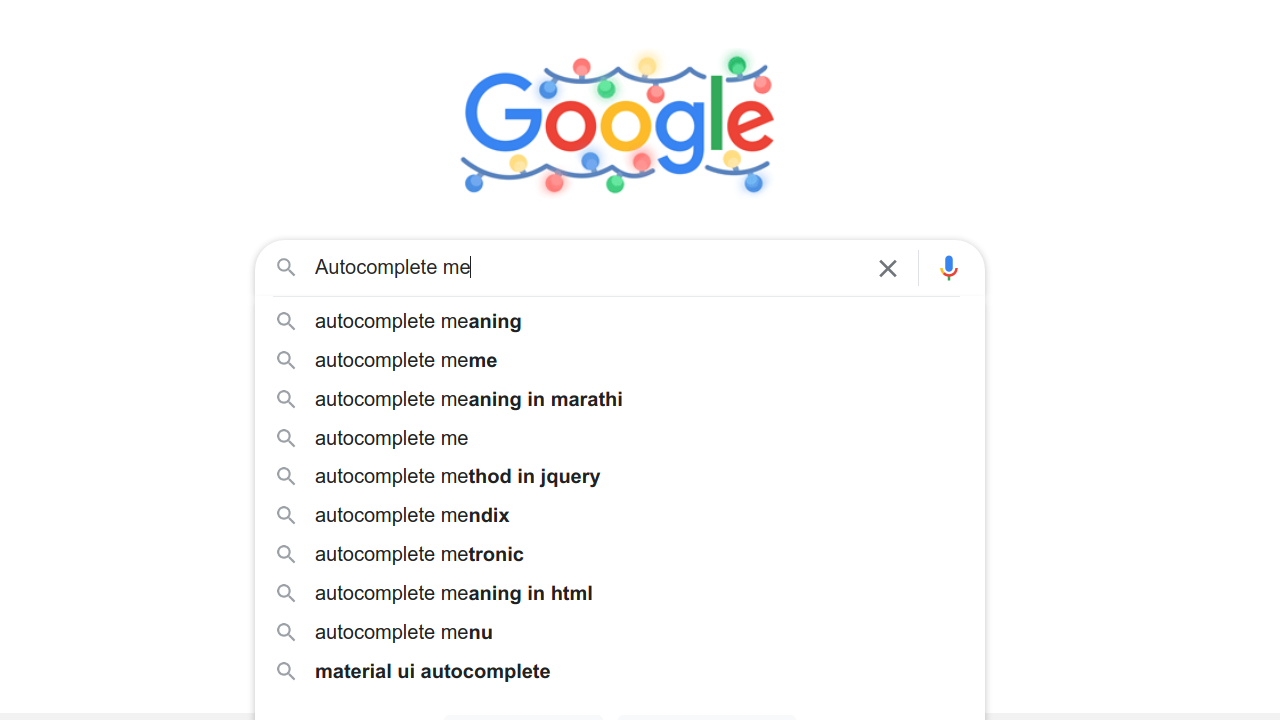
What is Autocomplete?
Autocomplete (also known as Autosuggest) is a feature of search engines that suggests and predicts what word or subsequent set of words could come next after one’s current input search term(s). These suggestions emanate from the billions of previous search queries that have passed through a search engine, including a user’s own past search history.
But are you Incomplete?
And do you feel complete when autocompletes you?
Perhaps yes, perhaps not, or perhaps you might simply be unaware of autocomplete’s hidden effects and consequences. The truth is, you are complete without autocomplete. And by the way, whoever thought autocomplete was a good default option? Laziness maybe?
The effects of autocomplete
1. Your search intentions are controlled or at least shaped by autocomplete
When was the last time you intentionally and consciously penned down your search intention into a search engine without being diverted to a similar or unrelated destination “something else”? Well, that’s one of the main side effects of autocomplete. Think for example about a professional writer in the process of articulating thoughts. Such a writer need not delegate that task to a machine to be able to control the narrative.
2. It can corrupt one’s mindset subconsciously by reinforcing many false beliefs
There is the notion that repeatedly seeing a message reinforces the belief that its notion is true. This is exactly what happens with autocomplete. It has the power to shape beliefs in a stealth manner. Although some of these autocomplete suggestions are true, many are outright false. Suggestions are generated based on perceived relevance from statistics like location, region, search history, popular opinions, etc. Therefore, your opinions and beliefs are ultimately being shaped by forces that you cannot see. Examples include suggestions that falsely associate specific names with specific alleged crimes. Behind the scenes as well, some suggestions are also intentionally being manipulated to favour certain people, concepts, or ideologies. This is known as the search engine manipulation effect (SEME). This hideous manipulation from autocomplete starts from the very first character you type in a search engine that supports autocomplete.
Tom Chatfield put it best. “Autocomplete is coming to be seen as a form of prophecy, complete with a self-fulfilling invitation to click and agree. Yet by letting an algorithm finish our thoughts, we contribute to a feedback loop that potentially reinforces untruths and misconceptions for future searchers.” - Tom Chatfield From Is Google autocomplete evil? - BBC Future
3. It causes anxiety
This would be more noticeable for frequent users of search engines, as it prevents one from accurately writing down search intentions/thoughts. Present words are lost in the moment while the search engine gives you hints about future words.
4. It leads to laziness
Sooner or later, your spelling ability degrades. This is because when machines do the work, they become unconscious masters of the conscious process of writing.
5. You become really bad at spelling
Can you write a full paragraph without a spellchecker highlighting any mistakes? You are only as good as what you do repeatedly. If the machines are doing the spelling for you, chances are that you become really bad at it. Bees will end up giving you a pass. You can test your spelling might here: Can You Pick Out the Misspelled Word in Each Sentence?
Going Forward…
Some search engines like DuckDuckGo, Bing, etc. provide the possibility to completely disable autocomplete. Others like Google, Yahoo! Search, etc. don’t currently allow this option and thus make autocomplete a forced feature.
Google for example has been in the search engine business for far too long and thus tends to produce great search results. If you are keen on using Google but would like to disable autocomplete, there is a solution to get this done.
Disable Autocomplete on Google
Mindful Google™ to the rescue! The Google search engine by far is the most popular search engine. Its built-in Autocomplete feature is known as Google Suggest. The Mindful Google™ extension will help you to disable autocomplete on Google’s search engine. It also comes with other neat sensible default configurations to remove search cards that grab your attention while you browse the internet, ultimately helping you get your focus back. Mindful Google™ is also able to eliminate attention-grabbing news, videos, and images from your search feed. This enables you to focus on your most important search results.
It’s time to take control and live a more intentional life. With tiny steps like these, I believe we will all get there. The inflection point of Will vs Manipulation. As technology advances, humans must advance too.
Here are other good search engines that allow you to disable autocomplete
- DuckDuckGo — Privacy, simplified.
- Startpage.com - The world’s most private search engine
- Ecosia - the search engine that plants trees
- Bing
Tip: For the Autocomplete that occurs in the address bar of the Google Chrome web browser, that can be easily disabled by visiting chrome://settings/syncSetup and then turning off the “Auto-complete searches and URLs” toggle.
Tip: Another similar feature called Autocorrect (also known as Autocorrection) exists whereby a digital device automatically corrects your spelling mistakes in input fields.
Additional Google Chrome extensions that you might find useful.
- Calm Twitter
- Desaturate Favicons
- DF Tube (Distraction Free for YouTube™)
- Enhancer for YouTube™
- Images ON/OFF
- Inbox When Ready for Gmail™
- Mindful Twitter™
- Minimal Twitter
- News Feed Eradicator
- OneTab
- Refined Twitter Lite
- Simplify Gmail
- Startpage — Private Search Engine
- Time Tracker
- Tweak New Twitter
